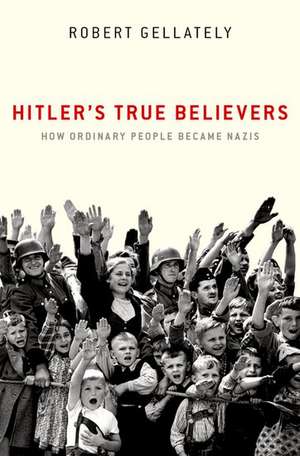Hitler's True Believers: How Ordinary People Became Nazis
Autor Robert Gellatelyen Limba Engleză Hardback – 4 sep 2020
| Toate formatele și edițiile | Preț | Express |
|---|---|---|
| Paperback (1) | 172.70 lei 3-5 săpt. | |
| Oxford University Press – 8 iul 2022 | 172.70 lei 3-5 săpt. | |
| Hardback (1) | 156.09 lei 10-17 zile | +76.43 lei 6-12 zile |
| Oxford University Press – 4 sep 2020 | 156.09 lei 10-17 zile | +76.43 lei 6-12 zile |
Preț: 156.09 lei
Preț vechi: 195.67 lei
-20% Nou
29.87€ • 31.07$ • 24.100£
Carte disponibilă
Livrare economică 10-17 februarie
Livrare express 06-12 februarie pentru 86.42 lei
Specificații
ISBN-10: 0190689900
Pagini: 464
Dimensiuni: 236 x 155 x 43 mm
Greutate: 0.84 kg
Editura: Oxford University Press
Colecția OUP USA
Locul publicării:New York, United States
Descriere
Understanding Adolf Hitler's ideology provides insights into the mental world of an extremist politics that, over the course of the Third Reich, developed explosive energies culminating in the Second World War and the Holocaust. Too often the theories underlying National Socialism or Nazism are dismissed as an irrational hodge-podge of ideas. Yet that ideology drove Hitler's quest for power in 1933, colored everything in the Third Reich, and transformed him, however briefly, into the most powerful leader in the world.
How did he discover that ideology? How was it that cohorts of leaders, followers, and ordinary citizens adopted aspects of National Socialism without experiencing the leader first-hand or reading his works? They shared a collective desire to create a harmonious, racially select, community of the people to build on Germany's socialist-oriented political culture and to seek national renewal. If we wish to understand the rise of the Nazi Party and the new dictatorship's remarkable staying power, we have to take the nationalist and socialist aspects of this ideology seriously.
Hitler became a kind of representative figure for ideas, emotions, and aims that he shared with thousands, and eventually millions, of true believers who were of like mind . They projected onto him the properties of the necessary leader, a commanding figure at the head of a uniformed corps that would rally the masses and storm the barricades. It remains remarkable that millions of people in a well-educated and cultured nation eventually came to accept or accommodate themselves to the tenants of an extremist ideology laced with hatred and laden with such obvious murderous implications.
Recenzii
This sweeping account draws on career-long research by one of the foremost scholars of Nazism today. Hitler's True Believers gets at the core of a perennial question: why did people choose to follow Hitler? Rather than focusing on the leader himself, Gellately delves deeply into an ideology defined by nationalism, socialism, and antisemitism. Nazi socialism must be taken especially seriously, he argues, and he shows that Germans often shared the party's ideas before they joined it, just as the party drew on popular impulses. To learn how the Nazis obtained and maintained the support of millions of Germans, this outstanding book will be essential reading for many years to come.
A remarkable read. Gellately argues with conviction that if we want to fully understand why millions of ordinary Germans became 'true believers' in Nazism, then we need to look beyond Hitler's 'charisma' and take seriously the presence of National Socialist dreams and desires in the plural.
A clear and accessible account of an atrocious yet widely popular regime.
Thoughtful, thorough and well-written book.
Thanks to Gellately's engaging storytelling, this book would serve as an excellent survey for undergraduates of how a fascist movement could generate sufficient legitimacy both for domestic policy changes and for a global war of destruction.
Notă biografică
Robert Gellately is Earl Ray Beck Professor of History at Florida State University. He is the author of Stalin's Curse: Battling for Communism in War and Cold War, Backing Hitler: Consent and Coercion in Nazi Germany, The Gestapo and German Society: Enforcing Racial Policy, The Politics of Economic Despair: Shopkeepers and German Politics, and Lenin, Stalin and Hitler: The Age of Social Catastrophe.
